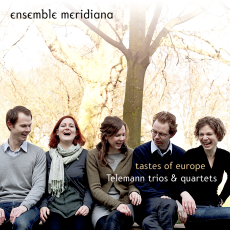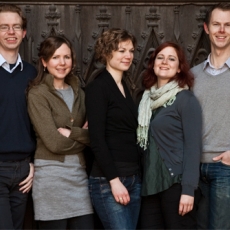Ensemble Meridiana - Tastes of Europe - Venerdì di Repubblica
In the seventh volume of the first edition of the ponderous Dizionario della Musica e dei Musicisti edited by Alberto Basso (Utet 1988) there is the complete catalogue of the works of Georg Philipp Telemann, a German composer born in 1681 and dead in 1767. This catalogue - very, very tight - goes from page 667 to page 735! It's by far the longest of the entire Dizionario. From this we can argue that the most prolific composer of the story of the music is just he, Telemann.
This poses another time the question about his fame and his real popularity, considering the fact that are very few the works of Telemann universally known in Germany or in other country of the world.
It's as much evident the his music is ever of the highest level. Every work denotes a great talent in thematic development and an unrestrained creativity. In short, there are still many things to discover and to understand in the works of Telemann. A recent recording made by Ensemble Meridiana, a group founded some years ago in Basel, expresses in the best manner possible the great beauty of Telemann's style, extremely personal and original also in confront with the works of his nearly contemporary Bach and Handel. The program includes some Trios and Quartets chosen by the musicians on the basis of the principle for which Telemann was an important mediator among the Italian style expressed by composers as Corelli and Vivaldi, the style of his Germany and the French style embodied by Lully (a composer born in Florence).
This thesis is clear and absolutely true, because Telemann brings the parts in these - in the majority of the cases excellent - compositions with a clear transparency and a vibrant agitation that come from the Italian and French schools, giving a fond and inspiring attention to the pressing and necessary movement of each instrument, in order to elevate the soul towards the travel of the Thought, when it pursues the aspect of the Reality, for reflecting it in itself. Hearing these works, we can understand what thought Telemann writing in 1740 his Autobiography: «I want to give the sensation of the correctness, when the notes pass from the lower to the higher tones, even affirming themselves, in the concreteness of a meeting of mutual exaltation».
(Translated from Italian)

